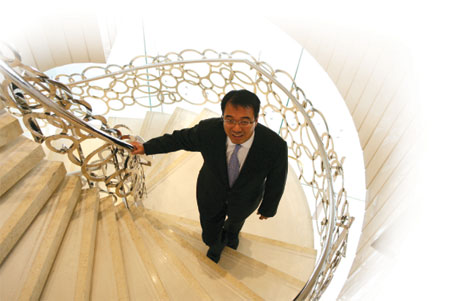Stairway to success

Barry Suen, the savvy general manager of Kunlun Hotel Beijing, has an uncanny sensitivity to the needs of his clients, though he rarely draws attention to it.
For example, the hotel's second floor CRYSTAL Restaurant is currently being adapted to suit Muslim customers. It will be Beijing's first halal restaurant in five-star hotels, the Hong Kong hotelier says matter-of-factly. The 45-year-old Suen joined Kunlun in 1998, taking over as its general manager in 2004.
Earlier, to cater to guests from the Middle East, the hotel invited foreign embassy staff to give lectures on Middle Eastern culture and customs. All the guests were given access to Middle East TV stations in their rooms, as also a copy of the Qu'ran, prayer mats, and a Mecca compass to locate the direction of Mecca.
On another occasion, it arranged for special types of night-robes and slippers favored by its Japanese guests. It also arranged a Korean corner at breakfast buffets, and made sure it had Korean favorites such as kimchi and bean paste pot stew.
When it comes to the Chinese guests, the focus is on providing the the right "feng shui". Hence, the lobby floor design resembles ancient Chinese coins. The front and side gates of the hotel has floor patterns resembling "8", which the Chinese consider auspicious. The hotel walls have plenty of water wave patterns, which are also considered symbols of fortune.
"We want our guests to see the hotel as a harbinger of fortune, with 'gold and money' on the ground," says Suen.
While many may find being regarded as an old, state-run hotel a disadvantage, Suen sees its bright side.
"As a hotel established as early as in 1989, we are very experienced and have established a solid relationship with our old clients," he says. "Many Chinese business people signed their first successful contracts here, and have grown with us."
There are currently nearly 60 five-star hotels in Beijing. Yet, despite this over-supply, Kunlun has managed to retain its place among the top. In a recent survey by the Beijing Tourism and Hotel Association, Kunlun Hotel's room occupancy ranked first among a list of more than 30 five-star hotels in the Chinese capital from January-June.
"There is nothing bad about being a state-run enterprise," says Suen. "The most important thing is [to have] the right management strategy and concept."
"In the past 10 years we have been constantly renovating and updating, to enhance the hotel's competitive capacity," he says. "Otherwise, with the opening of each new hotel, we would have gone one step lower in the ranking."
Despite the effect of the global financial crisis, average hotel occupancy at Kunlun from January-May hit 70 percent. But that is still lower than last year. "Compared to last year, hotel occupancy has fallen more than 15 percent, and room rate 30 percent," he says.
Suen concedes, though, that Kunlun has suffered less than other internationally managed hotels. About 40 percent of Kunlun's clients are foreigners, including those from Asian countries. The remaining 60 percent are Chinese.
Suen says the hotel's food is a big draw. Kunlun still holds the record in the number of F&B outlets in Beijing's hospitality area - it has nine restaurants and four bars and lounges. The cuisine ranges from Shanghai-style, Cantonese, and Sichuanese to Japanese, Korean, Muslim, and Vietnamese.
"Ten years ago, hotel residents mostly dined at the hotel," says Suen. "But Beijing has so many good dining options now. Hotel restaurants are having a tough time. They must also rely on local customers from outside the hotel."
He believes the F&B sector must diversify and keep up with new trends. That's why he has put Sichuan food along with Cantonese cuisine in the Chinese restaurant, and added Thai cuisine in the hotel's Vietnamese eatery.
"Kunlun's diversified F&B sector has contributed a lot to the improved marketing," he says. "Food and drink outlets have increased hotel occupancy rates."
To attract Chinese guests, Suen even invited an old chef from a Beijing street food stand to cook deep-fried flour stick and cake, as well as jellied bean curd - breakfast favorites among the Chinese.
Another aspect to which he pays much attention is staff training. "However luxurious a hotel, service is always the most important thing," says Suen.
He revealed that even in this gloomy financial situation, the hotel continues to organize a two-month training session for interns. Suen always asks his employees to pay the same respect to Chinese customers as they do to foreigners. The hotel also trains its staff on maintaining the right eye contact with guests, and on appropriate behavior during casual encounters.
"A service supervision committee sees that all these requirements are met," says Suen. "Staff with the best performance are rewarded with cash."
Suen is married and spends most of his spare time, when not playing golf or badminton, going around and trying the new restaurants in town. He also spends a lot of time outside of work doing team-building activities with various groups of the hotel's staff.
His family in Hong Kong visits sometimes, but Suen says he has got used to life in Beijing.
He is currently working on a 2,000 square-meter glass-enclosed lounge in the hotel garden.
Looking to the future, Suen says his main concern is how to cater to a new generation of guests, who will probably be young, mainly English-speaking entrepreneurs back from overseas.
"The hotel, and me, will have to keep up with the changes of time," he says.
Ye Jun
(China Daily 08/01/2009 page8)














